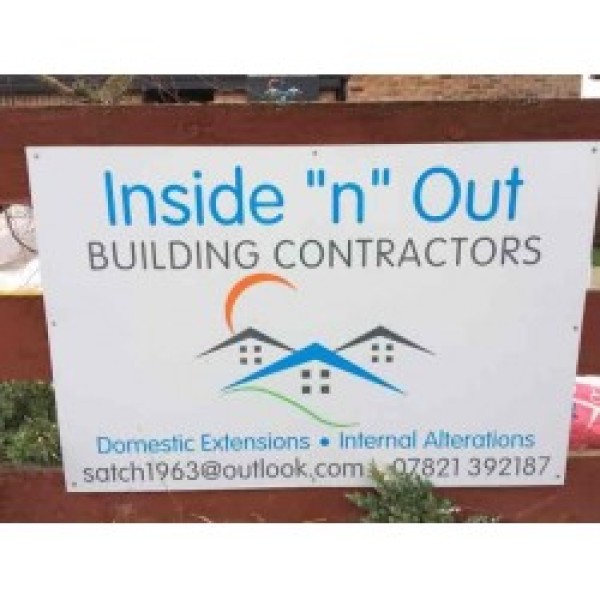Loft Conversions in Whitstable
Welcome to Inside 'N' Out Contractors, your trusted partner for all your building and renovation needs in Herne Bay and across Kent. As a... read more »
Welcome to Garner Building Services, your trusted partner for all your building needs in Cellarhill and across Kent. As a family-run busi... read more »
Kent Custom Projects Ltd is a premier choice for all your home renovation needs in Blean and throughout... read more »
Welcome to SP Bespoke Ltd, your premier choice for expert carpentry and renovation services in Stone Hill and through... read more »
Welcome to Bronzewood Lofts LTD, your go-to experts for builders, loft conversions, extension builders, and garage conversions in The War... read more »
Welcome to BMC Builders Kent Limited, your trusted pa... read more »
Welcome to PHR Domestic Solutions... read more »
Welcome to Megson Construction, your trusted partner... read more »
JAG Carpentry Ltd: Premier Roofers and Carpen... read more »
Welcome to JAG Carpentry, your trusted partner for al... read more »
Welcome to Lee Construction, your trusted partner for... read more »
G Saunders Carpentry is a distinguis... read more »
S And B Builders proudly serves the... read more »
Welcome to Fordash Construction, your trusted partner... read more »
Welcome to Rth Carpentry, your go-to experts for all... read more »
Able To Gable Roofing & Building is... read more »
Welcome to Dash Plastering And Building Services, you... read more »
Welcome to AB Electrical, your trusted partner for al... read more »
Colin Aldridge Builders: Premier Extension Bu... read more »
Welcome to Croxbi Builders, the premier choice for ca... read more »
Search Loft Conversions in places nearby
Understanding Loft Conversions in Whitstable
Loft conversions in Whitstable have become increasingly popular as homeowners seek to maximise their living space without the hassle of moving. This charming coastal town offers a unique blend of traditional and modern architecture, making loft conversions an attractive option for many residents. In this article, we'll explore the ins and outs of loft conversions, from planning and design to costs and benefits.
The Appeal of Loft Conversions
Loft conversions offer a fantastic opportunity to transform unused attic space into a functional and stylish area. Whether you need an extra bedroom, a home office, or a playroom, converting your loft can add significant value to your home. In Whitstable, where property prices are on the rise, a loft conversion can be a savvy investment.
Maximising Space
One of the primary reasons homeowners opt for loft conversions is to maximise space. With growing families or the need for a dedicated workspace, converting a loft can provide the additional room you need without extending the footprint of your home.
Enhancing Property Value
A well-executed loft conversion can significantly increase the value of your property. In Whitstable, where the demand for housing is high, adding an extra room or two can make your home more appealing to potential buyers.
Types of Loft Conversions
There are several types of loft conversions to consider, each with its own set of advantages and considerations. The choice will depend on your budget, the structure of your home, and your personal preferences.
Velux Loft Conversion
Velux loft conversions are the most straightforward and cost-effective option. They involve installing Velux windows into the existing roofline, allowing natural light to flood the space. This type of conversion is ideal for homes with ample headroom.
Dormer Loft Conversion
Dormer conversions involve extending the roof to create additional headroom and floor space. This type of conversion is popular in Whitstable due to its versatility and ability to blend seamlessly with various architectural styles.
Mansard Loft Conversion
Mansard conversions are more complex and involve altering the roof structure to create a flat roof with a slight slope. This type of conversion offers the most space but requires planning permission due to the significant changes to the roofline.
Planning and Regulations
Before embarking on a loft conversion in Whitstable, it's essential to understand the planning and regulatory requirements. While some conversions may fall under permitted development rights, others will require planning permission.
Permitted Development
In many cases, loft conversions can be carried out under permitted development rights, meaning you won't need to apply for planning permission. However, there are specific criteria your project must meet, such as height restrictions and materials used.
Planning Permission
If your conversion doesn't meet the criteria for permitted development, you'll need to apply for planning permission. This process involves submitting detailed plans to the local council and may take several weeks for approval.
Building Regulations
Regardless of whether you need planning permission, your loft conversion must comply with building regulations. These regulations ensure the safety and structural integrity of the conversion, covering aspects such as fire safety, insulation, and staircases.
Design Considerations
Designing your loft conversion is an exciting part of the process, allowing you to create a space that meets your needs and complements your home's style.
Layout and Functionality
Consider how you'll use the space and plan the layout accordingly. For example, if you're creating a bedroom, you'll need to think about where to place the bed, storage, and any en-suite facilities.
Lighting and Ventilation
Natural light and ventilation are crucial in a loft conversion. Velux windows or dormer windows can provide ample light, while ventilation can be achieved through windows or mechanical systems.
Interior Design
The interior design of your loft conversion should reflect your personal style and the overall aesthetic of your home. Consider using light colours and clever storage solutions to make the space feel larger and more inviting.
Cost of Loft Conversions
The cost of a loft conversion in Whitstable can vary significantly depending on the type of conversion, the size of the space, and the materials used. It's essential to budget carefully and consider all potential expenses.
Basic Costs
Basic costs include structural work, windows, insulation, and electrics. A simple Velux conversion might start at around £20,000, while a more complex mansard conversion could exceed £50,000.
Additional Expenses
Additional expenses may include planning fees, architectural drawings, and interior finishes. It's wise to set aside a contingency fund to cover any unexpected costs that may arise during the project.
Financing Options
If you're concerned about the cost, there are several financing options available, such as remortgaging your home or taking out a home improvement loan. It's important to explore all options and choose the one that best suits your financial situation.
Choosing the Right Contractor
Selecting the right contractor is crucial to the success of your loft conversion. A reputable contractor will ensure the project is completed to a high standard and within budget.
Research and Recommendations
Start by researching local contractors and asking for recommendations from friends or family. Look for contractors with experience in loft conversions and a portfolio of completed projects.
Obtaining Quotes
Obtain quotes from several contractors to compare prices and services. Ensure each quote includes a detailed breakdown of costs and timelines.
Checking Credentials
Check the credentials of your chosen contractor, including insurance, certifications, and references. A trustworthy contractor will be happy to provide this information.
Benefits of Loft Conversions
Loft conversions offer numerous benefits, making them an attractive option for homeowners in Whitstable.
Increased Living Space
One of the most significant benefits is the increased living space. A loft conversion can provide an additional bedroom, office, or playroom, enhancing your home's functionality.
Energy Efficiency
Modern loft conversions often include improved insulation, making your home more energy-efficient. This can lead to lower energy bills and a reduced carbon footprint.
Personalisation
A loft conversion allows you to personalise your home to suit your needs and lifestyle. Whether you want a cosy reading nook or a spacious master suite, the possibilities are endless.
Common Challenges and Solutions
While loft conversions offer many benefits, they can also present challenges. Understanding these challenges and how to overcome them is essential for a successful project.
Limited Headroom
Limited headroom can be a challenge in some lofts. Solutions include lowering the ceiling of the room below or opting for a dormer conversion to increase headroom.
Access and Staircases
Access to the loft can be tricky, especially in older homes. A well-designed staircase is essential for safe and convenient access. Consider spiral staircases or space-saving designs to maximise space.
Planning Delays
Planning delays can occur if your conversion requires permission. To minimise delays, ensure all paperwork is completed accurately and submitted promptly.
Environmental Considerations
As environmental awareness grows, many homeowners are seeking eco-friendly options for their loft conversions.
Sustainable Materials
Consider using sustainable materials, such as reclaimed wood or eco-friendly insulation, to reduce the environmental impact of your conversion.
Energy-Efficient Features
Incorporate energy-efficient features, such as LED lighting and solar panels, to enhance the sustainability of your loft conversion.
Green Roofs
Green roofs are an innovative option for loft conversions, providing insulation and promoting biodiversity. They can also enhance the aesthetic appeal of your home.
Frequently Asked Questions
- Do I need planning permission for a loft conversion in Whitstable? It depends on the type of conversion and your property's location. Some conversions fall under permitted development rights, while others require planning permission.
- How long does a loft conversion take? The duration varies depending on the complexity of the project. A simple conversion might take 4-6 weeks, while a more complex one could take several months.
- Can all lofts be converted? Not all lofts are suitable for conversion. Factors such as headroom, roof structure, and access will determine feasibility.
- Will a loft conversion add value to my home? Yes, a well-executed loft conversion can significantly increase your property's value, especially in high-demand areas like Whitstable.
- What is the cost of a loft conversion? Costs vary based on the type of conversion and materials used. Basic conversions start at around £20,000, while more complex projects can exceed £50,000.
- How can I ensure my loft conversion is eco-friendly? Use sustainable materials, incorporate energy-efficient features, and consider options like green roofs to enhance sustainability.
Loft conversions in Whitstable offer a fantastic opportunity to enhance your home's functionality and value. By understanding the types of conversions available, planning and regulatory requirements, and design considerations, you can create a beautiful and practical space that meets your needs. With careful planning and the right contractor, your loft conversion can be a rewarding investment in your home's future.









